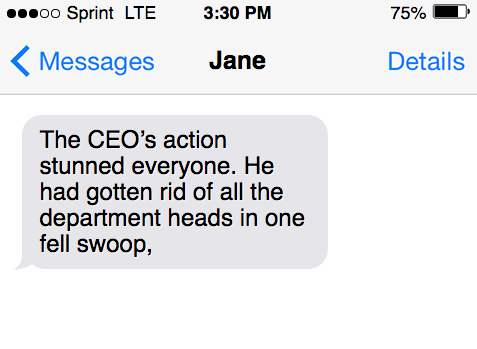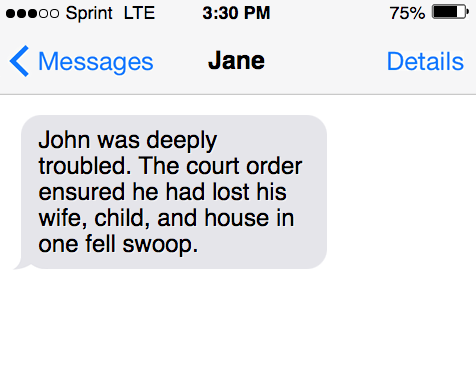What does “one fell swoop” mean? Why is this a common idiom in American English? And where did it originate?
Learn more in this simple grammar guide…
What does “one fell swoop” mean?
The idiom/phrase ‘one fell swoop’ means ‘all at once swiftly’. It refers to swift action taken suddenly. Fell swoop refers to how a bird swoops down from the sky on its prey and fells it. The idiom fell swoop refers to a quick, brutal, and ruthless action taken. The swoop refers to the suddenness or quickness of the action. Fell refers to the action which is ruthless or complete in nature.
The antecedents of the word ‘fell’ makes for interesting reading. Fell is derived from the Old Latin word fello, which means villain or wicked. This is why Shakespeare used the word fell in this phrase in his play Macbeth. ‘One fell swoop’ has negative connotations and implies a cruel cold-blooded act.

However, over the years the way this phrase has been used has softened the meaning. ‘One fell swoop’ no longer means a cruel act. It refers to a quick, decisive, or swift act. According to Miriam dictionary, the idiom is neutral in its application. Even cleaning a house can be described as done in one fell swoop.
The meaning here is of how the house was cleaned quickly at one go. It is not necessary that negative meaning is given to the use of ‘fell’ and ‘swoop’ in the idiom.
Origins of “one fell swoop”
The origin on ‘one fell swoop’ can be traced back to the works of Shakespeare. He is credited with having created this phrase or idiom. Shakespeare was the first person to use this phrase. In Shakespeare’s famous play ‘Macbeth’, we first see this phrase’s use.
The character MacDuff uses this phrase in Act IV Scene 3 of the play. MacDuff is told that his wife and children have been murdered. This is how he reacts:
All my pretty ones? Did you say all?
O hell-kite! All? What all my pretty chickens and their dam
At one fell swoop?
The character here compares his wife and children to chickens and their murderer to a kite or bird of prey. The use of ‘one fell swoop’ refers to how his entire family was taken swiftly and suddenly. Shakespeare’s use of one fell swoop refers to the sudden and quick descent of a bird of prey, which swoops down to attack its prey.

Swoop is the bird’s action but can be used to mean a quick action. The one fell refers to one stroke or one blow. The character is commenting on how his family was savagely and instantly taken-out.
After Shakespeare used this phrase, it began to be used later on as a common phrase.
Examples of “one fell swoop” used in a sentence
You can use ‘one fell swoop’ in a sentence to convey swift action. The examples below tell you how to use it in the right way.
- The CEO’s action stunned everyone. He had gotten rid of all the department heads in one fell swoop,
- John was deeply troubled. The court order ensured he had lost his wife, child, and house in one fell swoop.
- Sarah said, “There is no time to sleep. I need to catch up with the new season of my favorite show. I am planning to watch the entire series in one fell swoop.”
- The patriarch solved all his family disputes by dividing his property equally to make everyone happy. In one fell swoop, he had sorted out all the disputes.
- In one fell swoop, the thief had emptied the store. The owner found nothing on the shelves when he came to the store in the morning.
Is it one foul or fell swoop?
There has been a lot of discussion over whether ‘one foul swoop’ is right or ‘one fell swoop’. The original use of this phrase is ‘fell’. But fell is not used commonly to convey this meaning. Foul is more common in terms of the meaning conveyed. One foul swoop is a variant of one fell swoop. Some people prefer to use this for convenience.
Apart from foul swoop, some people even use ‘fowl swoop’. Both these are variants of ‘fell swoop’ used in practice. Technically, they are both wrong. They do not convey the meaning that the original phrase intended. ‘fell swoop’ is the right usage of this phrase.
Is “one fell swoop” a cliché?
Some people say the term ‘one fell swoop’ is a cliché. While it refers to how a bird of prey suddenly attacks, in practice, it is used in different ways. When used regularly, it sounds like a cliché. It depends on the context in which it is used and the effect it produces.
How do you pronounce “one fell swoop”?
The correct way to pronounce “one fell swoop” is wuhn-fel-swoop.
Sources
- How to Use One fell swoop Correctly – Grammarist
- How to pronounce one fell swoop in English – Forvo
- Explaining ‘fell’ in one fell swoop | Sentence first
- in one foul swoop – Wiktionary
- One-fell-swoop sentence example
Inside this article
Fact checked:
Content is rigorously reviewed by a team of qualified and experienced fact checkers. Fact checkers review articles for factual accuracy, relevance, and timeliness. Learn more.
Core lessons
Glossary
- Abstract Noun
- Accusative Case
- Anecdote
- Antonym
- Active Sentence
- Adverb
- Adjective
- Allegory
- Alliteration
- Adjective Clause
- Adjective Phrase
- Ampersand
- Anastrophe
- Adverbial Clause
- Appositive Phrase
- Clause
- Compound Adjective
- Complex Sentence
- Compound Words
- Compound Predicate
- Common Noun
- Comparative Adjective
- Comparative and Superlative
- Compound Noun
- Compound Subject
- Compound Sentence
- Copular Verb
- Collective Noun
- Colloquialism
- Conciseness
- Consonance
- Conditional
- Concrete Noun
- Conjunction
- Conjugation
- Conditional Sentence
- Comma Splice
- Correlative Conjunction
- Coordinating Conjunction
- Coordinate Adjective
- Cumulative Adjective
- Dative Case
- Determiner
- Declarative Sentence
- Declarative Statement
- Direct Object Pronoun
- Direct Object
- Diction
- Diphthong
- Dangling Modifier
- Demonstrative Pronoun
- Demonstrative Adjective
- Direct Characterization
- Definite Article
- Doublespeak
- False Dilemma Fallacy
- Future Perfect Progressive
- Future Simple
- Future Perfect Continuous
- Future Perfect
- First Conditional
- Irregular Adjective
- Irregular Verb
- Imperative Sentence
- Indefinite Article
- Intransitive Verb
- Introductory Phrase
- Indefinite Pronoun
- Indirect Characterization
- Interrogative Sentence
- Intensive Pronoun
- Inanimate Object
- Indefinite Tense
- Infinitive Phrase
- Interjection
- Intensifier
- Infinitive
- Indicative Mood
- Participle
- Parallelism
- Prepositional Phrase
- Past Simple Tense
- Past Continuous Tense
- Past Perfect Tense
- Past Progressive Tense
- Present Simple Tense
- Present Perfect Tense
- Personal Pronoun
- Personification
- Persuasive Writing
- Parallel Structure
- Phrasal Verb
- Predicate Adjective
- Predicate Nominative
- Phonetic Language
- Plural Noun
- Punctuation
- Punctuation Marks
- Preposition
- Preposition of Place
- Parts of Speech
- Possessive Adjective
- Possessive Determiner
- Possessive Case
- Possessive Noun
- Proper Adjective
- Proper Noun
- Present Participle
- Prefix
- Predicate



